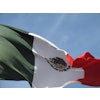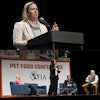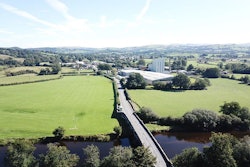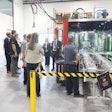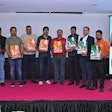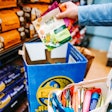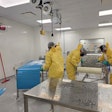TOMRA Food and Haarslev have formed a strategic partnership to introduce new sensor-based sorting technologies to the global rendering industry. This is expected to be a game-changer in the industry, enabling renderers and by-product processors to attain unprecedented levels of efficiency, food safety and product quality.
TOMRA Food is the leading designer and manufacturer of sensor-based sorting machines for the food industry and became the first, two years ago, to offer advanced sorting solutions to pet food producers. Expanding this offering to renderers to ensure that ingredients are safe and nutritious is the next logical step.
Haarslev is the leading supplier of solutions for meat rendering, poultry rendering, and fish by-product processing. Combining Haarslev's process knowledge and integration experience with TOMRA's technologies will ensure that each renderer obtains the optimal sorting solution.
This new partnership is established at a time of increasing demand for higher-quality, sustainable raw materials in the global feed and pet food industry. In addition to this consumer-driven trend, economic pressures caused by the COVID-19 pandemic have now made it more important than ever for processors to minimize waste and maximize efficiency.
Bringing the latest technology to the market
Many renderers will be familiar with the problems that can be caused in product streams by foreign materials such as gloves, hairnets, metal clips, plastic tags, foil, stones, and broken glass. Some of these foreign materials are initially large and easy-to-see objects but can be reduced in size by grinding processes to almost invisibly small fragments. If just one of these fragments reaches the end-product, customer complaints can escalate into expensive product recalls and long-lasting reputational damage.
The latest sorting technologies protect renderers, pet food producers, retailers, and consumers against these risks by detecting and ejecting foreign material's tiniest fragments with reliable accuracy. TOMRA's world-leading sorting machines can detect and eject foreign material according to appearance and color and according to structure and composition. This is made possible by employing high-resolution cameras, lasers, and unique Biometric Signature Identification technology, inspecting the product stream using visible spectrum wavelengths and near-infrared (NIR).
TOMRA's sorters' accuracy means that they remove unwanted materials with low levels of false rejects, minimizing product waste. And because TOMRA's technologies enable renderers to pre-determine desired bone meal levels and protein content, premium ingredients can be tailored to fetch a premium price.
Henning Haugaard, CCO of Haarslev, said: "We see a strong shift in the market towards increasing the end-product quality. One of the main challenges faced by renderers is foreign materials in processed animal protein. TOMRA Food has proven its strength in removing foreign bodies in various ways and is, therefore, the ideal partner for our customers and us."
Lars Povlsen, Global Sales Manager Proteins at TOMRA Food, commented: "Businesses in the pet food and rendering industry today face the same challenges and demands as those producing food for human consumption. This makes it a natural step for TOMRA to enter this market. Working with Haarslev, which has a great record in supporting this industry, we expect to see more renderers investing in the latest sorting technologies to remain competitive."
